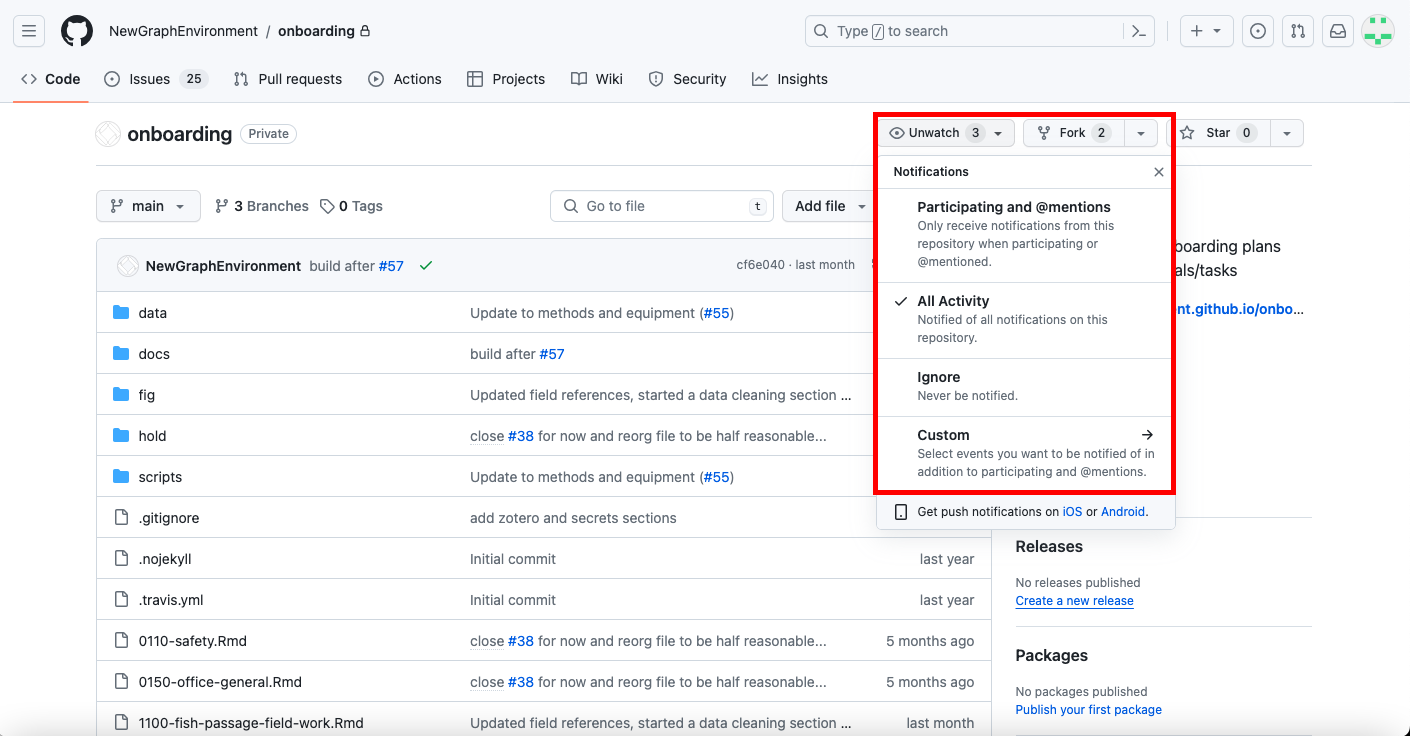4 Office - General Setup
4.1 Team Communication
Team communication is done through a bunch of systems:
Slackis our primary back and forth tool. It’s used for general questions, referencingissues, and is nice for topic-specific channels and handling code. Something to be aware of is that our conversations disappear after 90 days because we don’t pay for Slack, so if there’s something you don’t want to lose, create anissue!We don’t often text unless we are in the field, yay!
Emails, make sure to use explicit titles so that they are easily search-able later. You can also use Gmail
labelsto sort emails by project.We use Google calendar for holidays and meeting schedules etc. Please create a calendar using your
newgraphenvironment.comemail and share it with us, thanks.Github
issuesare the go-to for drawing attention to code. Anissuecan be anything from an actual problem with the code, a task that needs to be completed, or just a place to document what is happening. Here are examples:LGithub
milestonesare used to groupissuestogether. For example, all theissuesrelated to a specific project can be grouped together in amilestone. Here are examples:To stay up to date with what we are currently working no please make sure to
watchthe repos. This means you will get email notifications about issues and PRs, etc for that repo. Below is a screenshot of how towatcha repo.

4.2 Payroll setup
Please send over the following info so that you will be paid!
- bank name and institution number
- branch/transit number
- account number
- account type (chequings or savings)
Please also fill out this TD1 form which we need to keep on file.
All this info can be sent to tara@newgraphenvironment.com and please cc al@newgraphenvironment.com. Thanks.
4.3 Time tracking and expenses
We use Harvest for time tracking and expenses. Please make an account and we will invite you to join our account. Here are some general guidelines for time tracking and expenses:
Time Tracking:
- Time is always billed to a project even if the client is not always billed for it. Most tasks (ex. backgound research, troubleshooting technical issues, etc) are part of the job to get things done so they can be included conceptually in the tracking (although perhaps not always billed).
- Harvest has a built in timer which you can use for keeping track of which projects you are working on.
- Rounding to the nearest 15 minutes is a reasonable way to keep track of time.
- It’s really important include details about what we working on in the notes section as it helps with team management. It is also helpful for the times when we provide raw time tracking data to clients to help them understand all the great work that got done
- An example of detailed notes would be:
Chpts 3 -5 of R4DS, Upper Bulkley Roundtable Meeting, build collaborative GIS project - You can take a paid 15 minute break every 3.5-4 hours and these breaks can be tracked within the job where most of the work for that period is completed.
Expenses:
- For reimbursements, submit it in the expenses section of Harvest and attach a receipt of the items purchased.
- For mileage and per diems, there are drop down menus in Harvest.
Overtime averaging agreement:
- Due to the common scenario of long drives to field sites, overtime is accrued only after 40hrs/week (time and a half) or after 12hrs/day (double time). An example is that if we work 4 @ 10hr days in the field one week there is no overtime. However, if we work a 5th day for 11hrs - all of the 5th day’s 11 hours are either paid out at time and a half or banked at 1.5hrs/hr for future paid time off.
4.3.1 LastPass
LastPass is a great way to store and share passwords. Please get yourself set up with a LastPass account linked to the newgraphenvironment.com email so we can share passwords for certain things.
4.4 Performance Reviews
Performance reviews are a way for us to check in, reflect on what’s working, and identify areas where we can improve. These open conversations help us set goals, share ideas, and figure out what support is needed to help us work more effectively and collaboratively. We aim to do 2–3 performance reviews a year to stay connected and keep things running smoothly.
You can view and download our performance review template here.